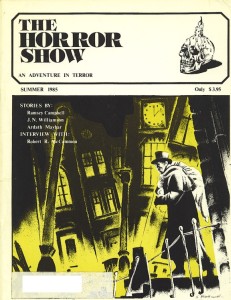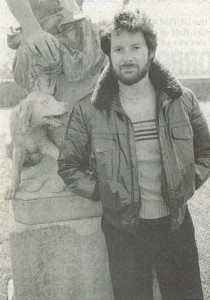 |
From the Archives:
William J. Grabowski Interviews
Robert R. McCammon
from The Horror Show,
Summer 1985
|
 |
On the highway of horror writers are many vehicles. Some are no more
than sputtering, patched-up clunkers, while others, bored-out and
roaring, are moving rapidly toward the inevitable flaming crash.
Then, one notices a few sensible, competently guided vehicles. They
are in good shape, these few vehicles—they know exactly where they
are going and with fuel enough to get there.
Robert R. McCammon has, does, and judging from his latest work, will
know where he is going always. Baal, McCammon's first novel,
was published while he was 26 years old. It was followed by
Bethany's Sin, The Night Boat, They Thirst, the
best-selling Mystery Walk, and his latest, Usher's
Passing, which seriously wounded the phrase "Nothing New Beneath
the Sun."
And McCammon's novelette, "Nightcrawlers," which opened J.N.
Williamson's superb Masques anthology, adds new dimensions to
the word terror. It had better win the World Fantasy Award. McCammon
is the only writer I know who writes between the chill hours of 10:00
p.m. and 4:00 a.m. when, as any self-respecting Pumpkin Man will tell
you, such things are done.
Robert R. McCammon resides in Birmingham, Alabama.
THS: I'm extremely fond of your latest novel, Usher's Passing.
How did you conceive such a brilliant work?
McCAMMON: "The Fall of the House of Usher" was one of my most favorite
Poe stories as a kid. I really liked the dark, chilly atmosphere and
the sense of nightmare-in-reality that Poe had created. Well, I'd
been kicking this idea around about doing a family saga of the Ushers
for a couple of years, but the plot didn't click into place until I
visited a huge estate called Biltmore, near Asheville, North
Carolina. The house is just totally unreal, with all these magnificent
rooms and banquet halls, libraries with hundreds of volumes of
leather-bound books—the whole aristocratic trip! But tourists only
get to see a small portion of the Biltmore house, because the
basement, the upper floor and the attic are closed off, and those
alone would make another huge mansion!
I did get to see the servants' quarters, which are these tiny cubicles
in one of the basements—and I'm told there are many basement
levels—and my mind started working. The house was built around the
turn of the century by the Vanderbilt family, whose patriarch
constructed Grand Central Station in New York City; they owned other
showplace estates around the country, and I thought, Yes, the Usher
family would be wealthy too! They'd be staggeringly wealthy, and
naturally they'd be in a business that would reflect something of
their tastes and attitudes.
So, it took off from my visit to the Biltmore Estate.
THS: You created a story which is truly singular—no one before
has even attempted anything like Usher's Passing.
Have you been getting much feedback from readers?
McCAMMON: Yes—much feedback! I've found that people either love it
or hate it, with no in-between! Fortunately, I think more people love
it than hate it, and the book is selling very well ... (it was) the
second book on a two-book contract I'd already signed with Holt,
Rinehart and Winston, of which Mystery Walk was the first.
THS: As I was reading Usher's Passing, I kept
wondering if what you had in mind, while drawing the character New
Tharpe, was a desire to illustrate, in the broadest manner, the
coming-of-age/initiation aspect of boyhood: New came face-to-face
with the darkest of terrors, and survived—even heroically. Was
this your intent?
McCAMMON: Yes, and I think this is a pivotal point in much of horror
literature; it's the idea of crossing a threshold—a point of no
return, if you will—and living to tell about it, to be changed and
altered into something stronger. There's a saying, incidentally, that
I think is very true, and I believe it has an Oriental origin:
Whatever opposes me and does not kill me, makes me stronger. I think
that's basically true of the initiation of experience, and nowhere is
it more true than in horror literature.
THS: On a somewhat different note, of your novels, excluding
Usher's Passing, which, in particular, do you consider the most
accomplished?
McCAMMON: I always like to think the child I've just given birth to
is the best, the brightest and the most handsome—until the next
child is born, that is. I think I enjoyed writing They Thirst the
most, though I think Mystery Walk is the closest to what I wanted it
to be. I figure that if I can get a book to be 70 percent or so of
what I first envisioned it to be, I'm happy—because translating from
the mind to the paper can be a very tricky and demanding process.
THS: I'd like to know what your thoughts are on the past of
supernatural literature. Is today's work "superior" to that proffered
by the old masters—from Poe to Bierce, LeFanu to Leiber? Or is the
question of quality perhaps irrelevant, and the genre's focus has
simply evolved, changed with the times?
McCAMMON: The old masters of horror literature certainly had to have
guts to do what they did—they had to say, "Hey, people! This is
what I like doing—this is what I have to do—and it may not be very
popular or make me rich, but that's the way it has to be!"
But the horror tale is as old as recorded literature—look at
Beowulf, for instance. Lots of monsters and sword-swinging
nastiness in that one ... and it is not fantasy, as some would say
because Beowulf was written to mirror that particular era,
whereas fantasy usually deals with an alternative reality. I think
horror literature is the most elemental, most truthful type of fiction
because horror writers are by-and-large unflinching observers of
society and are unafraid to rip the lid off the old crate that
everybody keeps down in their dark, private dungeon. Horror literature
can be both the most experimental, most daring type of fiction and the
most conservative and reassuring as well—I mean, we can tear the
hell out of just about whatever we want to, create our style of
nightmare-in-reality, and either leave that nightmare hanging or
stitch up the wound and say, "Okay, folks—the demon's back in the
box, it's okay to look now."
The most disturbing tale, I think, is one that leaves the nightmare
unresolved—and I think Usher's does that, to some extent,
because on one level Usher's is about nuclear arms sales, and I
certainly don't think that's something that can be tied up in a neat
little box and made to look pretty. But most horror novels take the
demon out of the box, shake it in your face and then shove it back in
that box again—and that's a very reassuring, conservative attitude.
"Well, we humans—we good ole boys and girls—won out over the demon
again. We looked him in the face, kicked him in the ass and shoved him
back in the box!"
That's like waking up from a nightmare and finding yourself
safe at home in your own warm bed, and you have vicariously conquered
the demon—at least for a time.
Again, the old masters had to really have courage to do their
thing—but I'm inclined to think that the writers of today are
better. Let's be realistic and stack writers like Peter Straub,
Charles Grant, Stephen King, Michael McDowell and Dean Koontz against
Poe, Bierce and LeFanu—well, the horror field is extremely
competitive these days, with the result that you have to keep going
further and further out on a limb to find original—if anything can
be considered totally original anymore!—ideas. Also, the quality of
the writing and the characterization in today's horror fiction is
excellent—even though life may still be echoing the basic themes
the old masters set forth. I actually think the writers of today are
producing works that would zap the minds of the old masters; I'd like
to believe Poe, Bierce and LeFanu would look
at our work and say, "Wow! Those guys are weird!"
Though—just a side thought—I've found horror authors to be among
the nicest folks you could meet anywhere, because horror writers get
to purge a lot of the things that make other people nasty.
THS: And what does the future hold for the Tale of Terror?
McCAMMON: The Tale of Terror—ah yes! Well, I was recently told by
a publisher that "Horror fiction is dying."
THS: Oh no!
McCAMMON: My reply to that was, "No, horror fiction is not
dying—reading is dying!" Because horror literature had been, is, and
always will be a popular form of fiction, and if anybody tells you
it's dying, they don't know much about it or they're tolling the
death-knell for reading itself.
I have to laugh at the idea of somebody who doesn't know beans about
the subject telling me that the same force that created The Epic
of Gilgamesh, Beowulf, The Monk,
"The Fall of the House of Usher," The Shining,
and Shadowland is dying! No! Those emotions and conflicts
are indestructible and reach far beyond publishing fads and fancies.
THS: In the genre of supernatural literature, whose works do you find
yourself returning to again and again?
McCAMMON: Well, though not strictly supernatural, I love reading and
re-reading the works of Ray Bradbury. He truly can weave a spell, and I
love the music in his stories. I grew up on Poe, Bradbury, and
Famous Monsters of Filmland magazine—though when I was a kid I
couldn't even bear to watch the horror movie previews at the local
neighborhood theater. I always screamed and threw my hands over my
eyes!
I was a real nerd, you see. Wore ties to class and everything.
Slicked-back hair. Goofy grin. Yeech!
So, maybe when I write I'm back in that theater again, making myself
look at the monsters I was too scared to behold as a kid. Who knows?
THS: Sounds like your boyhood days were frighteningly like my own.
Now, when you write, do you work from an outline or are you an
instinctual writer?
McCAMMON: No, I don't use an outline. I just go. Usually I have
specific scenes in my head, but I really don't know what's going to
happen. The only time I ever used an outline I almost went crazy from
boredom and wound up chucking three-hundred pages into the oval file.
THS: Any new projects under way?
McCAMMON: I am just finishing up a large novel—about eight hundred
pages, I believe—called Swan Song that I hope is going to be
the novel of total nuclear holocaust. I've been working on
this off-and-on for about four years, and the reason I haven't written
it before now is that I couldn't! I think my writing skill has just
recently reached a level that I can tackle something of this
magnitude, and it's got all sorts of characters and subplots and
heroes and villains—and I'm going to really miss these folks when
I'm through.
But on to the next, which I'll he starting after Christmas.
THS: And now, what advice can you give the aspiring novelist?
McCAMMON: My advice to the aspiring novelist is to dare to take a
personal demon or two out of that old locked box and throw him on
pages, wrestle with him, say something about the world, about
people, and about yourself. Make a difference! Give a damn!
Work hard! And don't give up! Because if you do give up, the demon
wins.
Author William J. Grabowski has just launched
Oblivion Press, a new independent publishing house.
This interview is reprinted here with his permission.
|